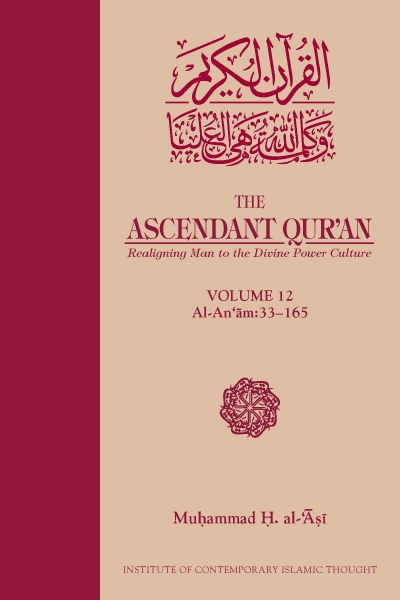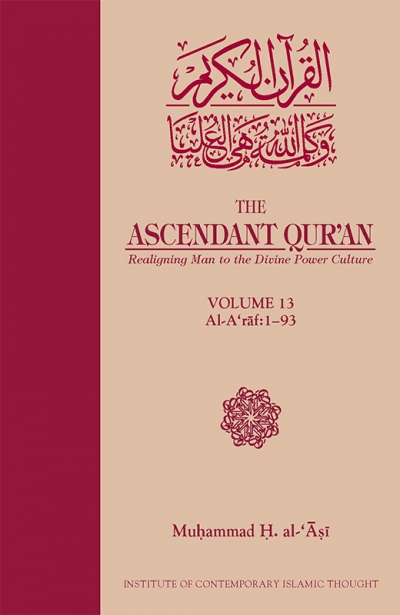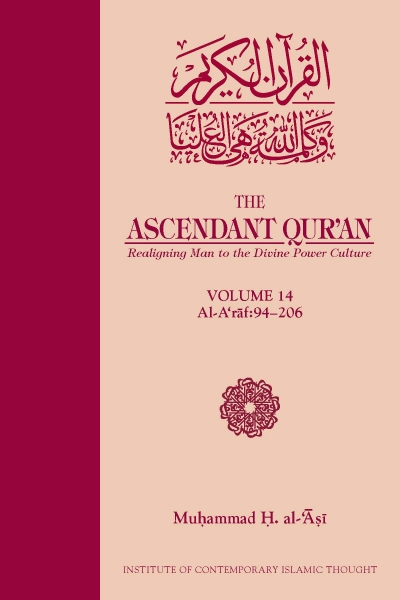The Ascendant Qur'an - Volume 12

Author(s): Muhammad H. al-'Asi
Publisher: The Institute of Contemporary Islamic Thought (ICIT)
Published on: Rabi' al-Thani, 1439 2017-12
ISBN: 978-1-927683-07-1
No. of Pages: 716
Price: $10 USD
Publisher’s Foreword
Surah al-An‘am was revealed in the last year of the prophetic mission in Makkah. It addresses a number of issues confronting the noble Messenger (SAW) at the time. For 12 years, he had been delivering the divine message to the people of Makkah but apart from a small number, the vast majority rejected it. Over time, such rejection assumed the form of derision and outright hostility led by the powerful clan chiefs. Seven years earlier, in the fifth year of the prophetic mission, a group of about 100 Muslim men and women were forced to seek refuge in Abyssinia to escape persecution. While the noble Messenger and his small group of followers endured the persecution inflicted by the Makkan elites, life had become progressively intolerable, made worse by the loss of two of the noble Messenger’s closest supporters: his kind and caring uncle Abu Talib, and his beloved wife for 25 years, Khadijah. This loss left the Messenger of Allah extremely exposed.
Despite familiarity with his impeccable character — the Makkans had conferred the titles of al-sadiq and al-amin upon him before the start of revelation — the stone-hearted mushriks refused to accept his message. This naturally caused him deep anguish. It was in these circumstances that Allah (SWT) sent consoling words to His beloved Messenger (SAW).
This surah deals with this as well as a number of other themes that can be summarized as follows:
1. Divine words of consolation are delivered to the noble Messenger, reassuring him that earlier prophets had faced similar rejection from their people.
2. The prophets’ responsibility is to communicate the message revealed to them from on high; they are not responsible for people’s acceptance or rejection. Human beings are free to accept or reject the divine message (18:29) and thus face the consequences of their choice.
3. In response to the mushriks’ demands that the Prophet (SAW) perform miracles, Allah initiates a paradigm shift through the agency of this Scripture (the Qur’an) and this final Messenger — that the history of physical and material miracles would now be replaced by a dynamic commitment to Allah (SWT) built upon a mental relationship of understanding, reasoning, and thinking; and miracles, should they be needed, would only fuel the headway of this Islamic momentum. Besides, were they to reflect on the matter just a little bit, they would have seen that the Qur’an itself is a living and permanent miracle the like of which had not been produced before.
4. The mushriks were questioning why Allah’s punishment did not immediately befall them for their refusal to accept the divine message. In the first instance, Allah’s mercy gives even such people myriad chances to reconsider their choices. Secondly, Allah’s timescale is not contingent upon human priorities and the futile resolution of doubts entertained by those who never intended to accede to His authority. And so, Allah (SWT) takes their argument to its logical conclusion: if divine wrath were to overtake them (6:63–65), who could save them?
5. The story of Ibrahim’s struggle for guidance is narrated. This is to remind the mushriks — who claimed to follow the din of Ibrahim and inherited the custodianship of the Ka‘bah — that it was Ibrahim (a) who used his God-given faculty of reasoning to affirm that there can be no divinity and authority other than Allah (SWT), and hence his secure commitment (iman) was a natural outcome of that process. The point of the story, therefore, was to encourage the Arabians of Makkah (and all others after them) to exercise the same faculty with the ayat of the Qur’an and reach the same conclusion as Ibrahim, thereby confirming his legacy through the agency of Muhammad and truly belonging to Ibrahim’s din as they had been claiming all along. The fact that they rejected Muhammad (SAW) proves they were not keen on thinking, which is the case with all despotic and illegitimate temporal authorities and why they need force to achieve their ends and retain power.
6. Allah (SWT) reminds them that it is He who causes the rain to fall from the sky, who makes the grain sprout from the earth, and who enables the trees to bear fruits of different kinds. These are among His favors to all people yet the ungrateful ones refuse to take heed.
7. Also covered is the proscription against the consumption of animal flesh that has been sacrificed under conditions where the consciousness and recognition of Allah is not paramount (6:121). The surah goes on to reject the jahili practices of the mushriks pertaining to the allocation of animal offerings to their deities and the misallocation of such offerings to certain members of their own society. Going forward in time, these discriminatory practices would be decommissioned, and Allah (SWT) would be relied upon to determine what is and what is not fit for the consumption of all human beings regardless of class, status, gender, race, and the like,
Say [O Prophet], “In all that has been revealed to me, I do not find anything forbidden to eat, if one wants to eat thereof, unless it be carrion, or blood poured forth, or the flesh of swine — for that, behold, is loathsome — or a sinful offering over which any name other than Allah’s has been invoked…” (6:145).
In the sequence of revelation of the surahs, this is the first time that we encounter the issue of meat that is either permissible or forbidden for man to consume. Readers familiar with the Qur’an would know that the question of halal and haram meat has also been highlighted in Surah al-Ma’idah (5:3). While placed before Surah al-An‘am in the noble Qur’an, Surah al-Ma’idah was revealed in Madinah in the final year of the noble Messenger’s life on earth, about 10–11 years after al-An‘am was sent down..
Since Allah (SWT) is our Creator, He knows what is beneficial and what is harmful for us. Thus, He has clarified these issues to enable us to eat wholesome food that promotes health, which in and of itself is essential for us to effectively handle the weightier responsibilities of human existence on earth. Today, however, Muslims, and indeed the whole of humanity, are confronted by other challenges: genetically modified foods and animals injected with hormones and antibiotics, custom “manufactured” (not grown) for an instant-gratification culture that tries to arrest its gluttony with prescription drugs and organ-ectomies. The negative effects of such practices, motivated by greed and profit, have become apparent in the form of “diseases of modernity,” such as different types of cancers, heart disease, arthritis, diabetes, attention deficit disorder, macular degeneration, and on and on. When humans abandon Allah’s laws, they fall to the lowest of depths and dismiss the harm they cause to themselves.
In his monumental tafsir, The Ascendant Qur’an: Realigning Man to the Divine Power Culture, Imam Muhammad al-‘Asi guides us through these intricacies and alerts us to the dangers of human-tampered foods and meats. It is his discussion of such vital issues that makes this tafsir unique. The mufassirs of earlier tafsirs had not confronted the issues of genetically modified foods or hormone- and antibiotic-injected animals, as such practices — and the human “gods” who manage them — were either nonexistent or not widespread at the time.
The editor of this volume, as all earlier volumes of the tafsir so far, Afeef Khan, has done an admirable job in ensuring the smooth reading of the text. Copious endnotes and references are also available to assist the more enterprising readers to delve deeper into the subject matter. A number of brothers, among them Imran Khan, Redzuan Shaw, and Hassam Munir have helped in different stages of this tafsir either by proofreading or in preparing the indices. We are grateful to them all for their selfless help and dedication.
We are also grateful to all those who have helped in other ways in getting us this far with a project of monumental proportions. May Allah (SWT) reward them for their help and support, amin. We are confident that this tafsir will occupy an honored place in the massive compendium of tafsir literature and will be of benefit to Muslims as well as sincere non-Muslims seeking the truth and understanding of the divine message. An electronic version of this twelfth volume is available for reading, or downloading from the ICIT digital library (www.icit-digital.org). Hard copies can of course be obtained directly from ICIT and Crescent International, or from various online retailers.
Zafar Bangash
Director, Institute of Contemporary Islamic Thought (ICIT)
Toronto, Ontario, Canada
al-Muharram 17, 1439ah (10-8-2017ce)


